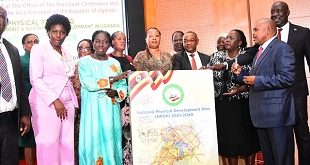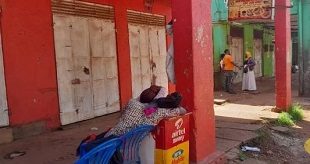
By Ronald Musoke
The National Environment Management Authority (NEMA) has been dragged to court by a local civil society organization in an attempt to force it to release details of an environment impact assessment it sanctioned four years ago allowing a Chinese firm to do quarrying activities in a village in Mukono District.
The Centre for Health, Human Rights and Development (CEHURD) filed the case on Dec. 04 in a Kampala court against NEMA challenging its refusal to grant access to requests made for access to public information.
In April this year, three requests for information were sent to NEMA asking for access to an environmental impact assessment report, the initial environment audit report and public comments received prior to the approval of the EIA for China Communications Construction Company (CCCC).
The documents requested for are in relation to stone quarrying activities in Bamutakude and Kiryamuli villages in Kyampisi sub-county in Mukono District which have allegedly “adversely affected” the community by polluting the environment with noise, dust and contaminated the only source of clean and safe water in the villages.
In the affidavit sworn by Geoffrey Wakkaabu Kiwanuka, a teacher and resident of Kiryamuli village, before 2012 when CCCC started their stone quarrying activities, a meeting was held by NEMA officials in his village in which the residents were informed about CCCC’s activities.
The meeting according to the affidavit, which The Independent has seen, was held in the residence of Kiryamuli’s LC I secretary. However, details of how the residents’ lives would be affected by CCCC’s activities were never divulged to the residents.
According to the 1998 EIA regulations, a developer is supposed to take all necessary measures to seek the views of the people in the communities which may be affected by the project during the process of conducting the study.
In seeking the views of the people, the developer should publicize the intended project, its anticipated effects and benefits through the mass media in a language understood by the affected communities for a period of not less than 14 days.
Wakkaabu said NEMA never informed the residents about the obligations of CCCC in relation to their quarrying operations within the community yet the quarrying continues to affect the people negatively.
“The blasting from the quarry emits a lot of dust which fills the atmosphere causing severe air pollution in the environment,” the affidavit reads in part.
“I want to know the conditions given by NEMA to CCCC for health, safety, wellbeing and environmental protection of residents of both villages and whether those conditions are also being fulfilled by the company on an ongoing basis.”
The documents requested were meant to guide the community members on the obligations which NEMA imposed on CCCC when the environment watchdog approved CCCC’s license to quarry stones in the villages.
According to CEHURD, NEMA refused to avail the documents to them and the residents of the villages of Bamutakude and Kiryamuli.
“NEMA has both a constitutional and statutory duty to provide access to information which is in its possession when any member of the public requests for its accordance with the law,” said James Zeere, a programme officer at CEHURD.
“Having failed in its obligations to protect the people of Kiryamuli and Bamutakude villages against the excesses of CCCC, the very least it can do is provide the community members with information about the quarrying in their backyards which has drastically affected their daily lives.”
Zeere said since information is power that can be wielded for and against the public depending on who controls the information and who is allowed to access it, NEMA can empower the people of Kiryamuli and Bamutakude by granting them access to information that will enable them to protect their environment from being degraded by stone quarries.
Uganda’s Access to Information Act, 2005, applies to all information and records of government ministries, departments, local governments, statutory corporations and bodies, commissions and other government organs and agencies unless specifically exempted by this Act.
The Act grants every citizen the right to access information in the possession of the state agency except when the release of information affects state sovereignty or interferes with privacy rights.
The exemptions are cabinet records and those of its committees, records of court proceedings before the conclusion of the case.
It is upon this background that CEHURD wants court to compel NEMA to provide access to the documents requested to enable the people of Kiryamuli and Bamutakude villages protect themselves from the excesses of CCCC.
When contacted, Bob Ambrose Nuwagira, NEMA’s senior information, education and communication officer told The Independent that the agency had been served with the court summons but he could not comment beyond that.
“As the subjudice rule goes, I am advised not to comment about matters which are in court. But all the same our lawyers are dealing with it and we shall await judgment of court,” he said.
 The Independent Uganda: You get the Truth we Pay the Price
The Independent Uganda: You get the Truth we Pay the Price


